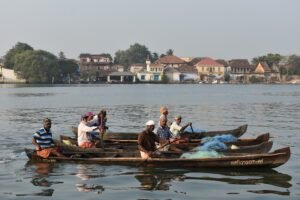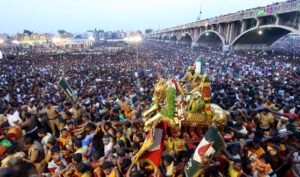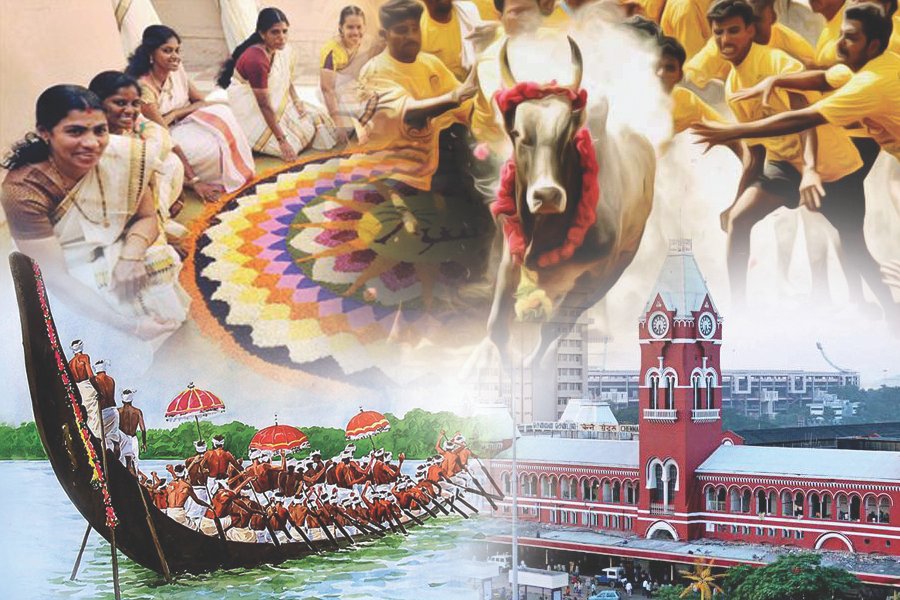Read in : தமிழ்
In a recent issue, India Today magazine ranked states in India on many parameters such as income, health, governance and ease of doing business. One parameter that stood out was the Happiness Index. According to that index, Kerala is the happiest state while Gujarat is a distant second. Coming closely next was Tamil Nadu. The average Malayali is happier than the Tamil, the survey suggests.
 We were raised to look at high suicide rates in Kerala and well reported cases of depression and substance abuse in Kerala to think otherwise. But, those scary statistics and reports may well be attributed to better data collection and better reporting.
We were raised to look at high suicide rates in Kerala and well reported cases of depression and substance abuse in Kerala to think otherwise. But, those scary statistics and reports may well be attributed to better data collection and better reporting.
The accompanying article in India Today acknowledges the difficulty in assessing how happy people are but assumes that there are certain guarantors of unhappiness. These guarantors appear logical enough. Debt can eat away our happiness, for instance. So can not having a job and not earning enough. Poor health can certainly make us unhappy.
Similarly, poor governance can irritate us, so can poor infrastructure such as not having good roads. If you are likely to be mugged when you step out on the streets, the fear can stress you out. So, yes, poor state of law and order can make one insecure and therefore prevent us from being happy.
The survey assumes that if a state does better on these indices, its people are likely to be happier. If there is not enough cause for unhappiness then we can be happy, the survey assumes.
The survey assumes that if a state does better on these indices, its people are likely to be happier. If there is not enough cause for unhappiness then we can be happy, the survey assumes.

Madurai Chithirai festival
What about the weather? It is said gloomy weather has a consequence. The weather in Great Britain, with its incessant rain, overcast skies and irregular sun, is said to be the cause of British moodiness. Winston Churchill’s depression was said to be symptomatic of a very British affliction, not his mental health.
The British are living off all the stolen wealth from colonies and they have no reason to be sad, the Malayali, Shashi Tharoor has implied. The blokes may need to just breathe easy and love themselves. Yoga and meditation would take care of their psychological well being.
The India Today survey doesn’t take into account so-called subjective factors, however. It would probably rank the UK as a very happy nation.
There is not much to choose between Kerala and Tamil Nadu in terms of weather, in any case. Both states are as hot as they come. Though the monsoon in Kerala is more regular, it can be as devastating as the non-monsoon Tamil Nadu gets in the winter months.
There is one crucial difference between the two states. The Malayali stereotype is one Malayali moving to a place outside his state for work and soon bringing many more Malayalis to work there. Stereotypes have a measure of truth and the Malayali diaspora in Persian Gulf region is just one example of that. Malayalis have strong community linkages in their neighbourhoods in cities and villages. The local leftist comrade serves as the bridge for the community, serving it and creating bonds that cut across caste and religion. This makes Malayalis band together outside Kerala, too. Powerful local self government gives Malayalis a sense of empowerment in executing tasks that matter to them and this only enhances community interaction.
Though elections to local bodies have been made mandatory by central law, the political culture in Tamil Nadu is not favourable to decentralization beyond the state level. Both the Dravidian parties opposed the Panchayati Raj bill of Rajiv Gandhi government arguing that the law takes away the state government’s powers.
Since the days of K Kamaraj’s time there has been a de-emphasis on local self government in Tamil Nadu. Village schools were taken out of the purview of local panchayats during his tenure.
For nearly two decades of Dravidian party rule, there were no local body elections. Crucial functions such as water, roads and sanitation went into the hands of state government agencies such as TWAD board. Then the local Karnam, or the village headman, was replaced by the Village Administrative Officer. While the Karnam was part of the village panchayat, the VAO reports to the district collector.
Dravidian parties have ministers in-charge of each district, bringing centralized political control over district administration. The District Panchayat is weak and ineffective since in our highly urbanized state, municipal corporations are outside the District Panchayat’s purview. Today’s village panchayat presidents may have check writing powers but those powers don’t necessarily mean decision making authority.
In a recent article, a health expert argued that widespread resistance to the Covid vaccine in Tamil Nadu can be attributed to lack of community linkages that creates awareness. The poor state of local self government in Tamil Nadu is a direct cause of this.
The India Today Happiness Index lists hygiene, health and environment as happiness parameters. The Kerala village or even the city certainly ranks high in these as a result of strong and powerful local bodies.
The India Today Happiness Index lists hygiene, health and environment as happiness parameters. The Kerala village or even the city certainly ranks high in these as a result of strong and powerful local bodies. Strong local governments had helped Kerala achieve high sanitation coverage decades before the central government started advocating it.
Psychologists advise individuals to create strong family bonds and integrate with local communities to fight depression. It takes a village to make a person happy and the Malayali is therefore happier.
Read in : தமிழ்











